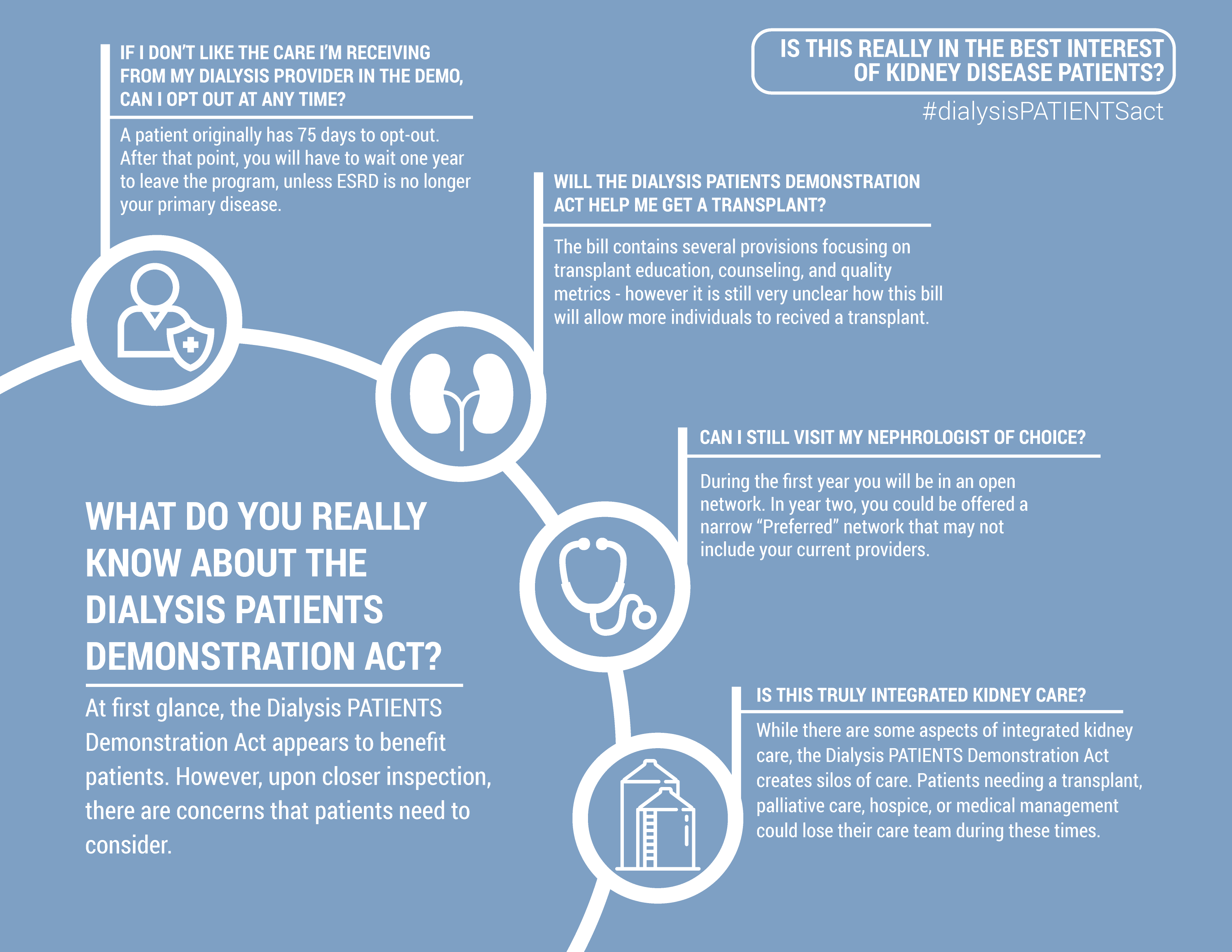The Dialysis PATIENTS Demonstration Act of 2017 is not in the best interest of all kidney patients.
H.R. 4143/S. 2065
While the legislation addressed integrated care, it does so in a way that attempts to remove the patients’ choice. All patients should have a choice in their dialysis provider. If we can continue to have a broad range of providers, patients on dialysis can benefit from the different and often innovative approaches developed by each provider. There is no reason for patients to be involuntarily enrolled into an organization and then be required to opt-out within a specific block of time, in order to preserve their freedom of choice. This puts an unnecessary burden on the patient. Patients, working with their physicians and family members, should continue to have the choice of plan and/or provider that all Medicare beneficiaries enjoy.
In addition, to participate in this demonstration, providers must be able to bear capitation risk or partner with an entity that can. Very few, if any, small and medium dialysis providers could do this, leaving just a handful of large entities participating in this model. The passage of this bill may result in smaller/nonprofit providers going away or patients not being able to use them.
Lastly, any new end stage renal disease (ESRD) demonstration model should not be separate from the rest of care received throughout a kidney patient’s health journey. An innovative, integrated kidney model should include chronic kidney disease (CKD) care, palliative (which is normally performed in conjunction with providing dialysis to a patient), transplantation, medical management, and hospice. Unfortunately, the Dialysis PATIENTS Demonstration Act covers none of those critical services and requires a patient to leave the organization if that care is needed. Creating silos of care is not in the best interest of the patient. Any model addressing integrated care for patients on dialysis should keep all patients in the model, despite what care is needed, so that these patients will not risk being abandoned by their expanded care team at critical times.
Based on these concerns, please join us as we oppose the Dialysis PATIENTS Demonstration Act.
Letters of Opposition:
Letter of Opposition to Senate
American Association of Kidney Patients Letter of Opposition to the Senate
American Association of Kidney Patients Letter of Opposition to the House
Atlantic Dialysis Management Services’ Letter of Opposition to the House
Dialysis Clinic, Inc’s Letter of Opposition to the House
Nonprofit Kidney Care Alliance’s Letter of Opposition to the House
Northwest Kidney Centers Letter of Opposition to the Senate
Northwest Kidney Centers Letter of Opposition to the House
Groups that Oppose DPDA include:
Aetna
American Society of Nephrology
American Society of Transplant Surgeons
American Society of Transplantation
Association of Organ Procurement Organizations Atlantic Dialysis Management Services
Blue Cross Blue Shield Association
Blue Shield of California
Centers for Dialysis Care
CVS Health
Dialysis Center of Lincoln

FAIR Foundation
Greenfield Health Systems

Nonprofit Kidney Care Alliance

North American Transplant Coordinators Organization
Olympic Peninsula Kidney Centers
Organ Donation and Transplantation Alliance
Puget Sound Kidney Centers
Service Employees International Union
![]()
